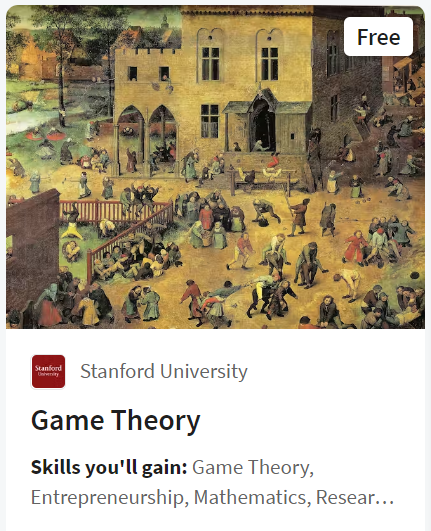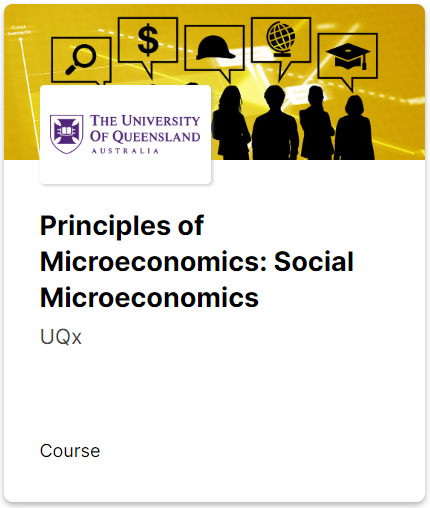- Home
- Courses
- Business Courses
- Game Theory Courses
5 Best Game Theory Courses Online to Learn Strategic Decision Making
Would you like to be able to analyse and predict the choices that two or more people will make in any given situation? Here are the best game theory courses.

If you are interested in learning the hidden mechanics behind what makes winners win and losers lose, then game theory is an intriguing subject to look into.
Game theory is the scientific study of strategically interdependent decision making.
It was originally developed and applied to economics to determine the behaviours of consumers and markets, but is now used to study the behaviours of individuals in a multitude of situations and constraints.
Here are the best game theory courses online to help you understand the concept of optimal decision making in strategic settings.
Not only do these courses contain fascinating theory, they also contain practical applications that transfer into real life skills like negotiation and bargaining.
This post may contain affiliate links. Please read my disclosure for more information.
What are the Best Game Theory Courses?
Here are the 5 best game theory courses to enroll in online this year:
1. Welcome to Game Theory (University of Tokyo)
Welcome to Game Theory is a course by the University of Tokyo that presents the basic ideas behind key concepts in game theory, such as equilibrium, rationality, and cooperation.
It's the least technical course on this list, and uses very little mathematics, so it's an ideal choice for learners who are looking for a high-level introduction to game theory.
Course Syllabus:
- Week 1: Why Do We Need Game Theory, and What Does It Tell Us?
- Week 2: Understanding Nash Equilibrium
- Week 3: Rationality, Knowledge, and Evolution in Games
- Week 4: Sustaining Cooperation
This course aims to outline the basic ideas of game theory that are often hidden behind mathematical definitions.
You'll discover how game theory has been applied to a number of disciplines, including economics, political science, psychology, sociology, biology, and computer science.
In the course, you will also be asked to play a simple card game to see how it feels to make strategic decisions.
Key course features:
Flexible deadlines
- Reset deadlines in accordance with your schedule.
Shareable Certificate
- Earn a Certificate upon completion
100% online
- Start instantly and learn at your own schedule.
Beginner Level
- Approx. 21 hours to complete.
=> Enroll in the "Welcome to Game Theory" course on Coursera here.
2. Game Theory (Stanford University)
When we talk about "games", we're usually referring to things like chess, poker, basketball, tennis, and so forth.
However, game theory expands beyond these, helping us model things of greater consequence like conflict among nations, political campaigns, competition among firms, and trading behaviour.
This game theory course by the University of Stanford takes things up a notch by teaching you key definitions in game theory and walking you through a variety of examples including classic games and a few applications.
Course Syllabus:
- Week 1: Introduction and Overview
- Week 2: Mixed-Strategy Nash Equilibrium
- Week 3: Alternate Solution to Concepts
- Week 4: Extensive-Form Games
- Week 5: Repeated Games
- Week 6: Baynesian Games
- Week 7: Coalitional Games
- Week 8: Final Exam
This course includes online lab exercises and problem sets that will test your knowledge of the game theory concepts discussed. You'll also get to play some games, which is a great way to learn these complex concepts.
Once you graduate, you'll be able advance to the next level with the Game Theory II: Advanced Applications course, also offered by Stanford University.
Key course features:
Flexible deadlines
- Reset deadlines in accordance with your schedule.
Shareable Certificate
- Earn a Certificate upon completion
100% online
- Start instantly and learn at your own schedule.
Beginner Level
- Approx. 18 hours to complete.
=> Enroll in the Game Theory introduction course on Coursera here.
3. Principles of Microeconomics: Social Microeconomics (University of Queensland)
If you're looking for a course that covers game theory as an element of microeconomics as a whole, this is the course for you.
This course by the University of Queensland, Austrailia will lead you down a path of strategic thinking as you explore topics such as imperfect competition, price discrimination, oligopoly, and game theory.
You will learn about the difference between public goods, private goods, collective goods, and common goods - and how competitive markets can produce inefficient outcomes in the presence of externalities.
The topics that are covered within this course include:
- How and why price discrimination is used
- Different price discriminations and peak load pricing
- Game theory
- Asymmetric Information and how to collect the perfect amount of economic information
- Principal-Agent and Adverse Selection Problems
- Moral Hazard Problem and the Costly to Fake Principle
This course is part of the Professional Certificate in Microeconomics offered on edX. After this Social Economics course, you can enroll in the other two courses - An Economist Way of Thinking and Competitive Markets - and earn a verified certificate!
Note that you are not required to have any experience or knowledge on particular academic disciplines for this course; however a background in Economics and Statistics will be helpful.
Key course features:
- Length: 6 Weeks
- Level: Intermediate
- Effort: 1-2 hours per week
- Course Type: Self-paced on your time
- Certificate available upon completion
- Associated programs: Professional Certificate in Microeconomics
=> Enroll in the Principles of Microeconomics: Social Economics here.
4. Hands-On Microeconomics: a primer in Game Theory (Udemy)
This highly-rated Udemy course introduces the main concepts of non-cooperative game theory via a hands-on approach.
The course is taught by Luigi Ventura, Professor of Economics at Sapienza, University of Rome.
Ventura has lectured extensively in the fields of microeconomics, macroeconomics, econometrics and managerial economics at several leading institutions worldwide, such as the University of Southampton, the London School of Economics and Political Science, the University of Hawaii.
The course is particularly aimed at first and second year economics students, social science students, and managers wishing to gain insight into theoretical game concepts in order to think more strategically.
What you will learn:
- The main concepts in non-cooperative game theory and how to use them to find equilibria for actual games
- Popular battle horse games, such as matching pennies, the prisoners' dilemma, the battle of sexes and the game of chicken
- Equilibrium concepts such as that of Nash equilibrium and subgame perfect equilibrium
- How to make comparisons between game theoretic concepts and market forms
Course Syllabus:
- Introduction
- Components of a game
- The Prisoners' dilemma
- Defining an equilibrium
- Finding an equilibrium: the Prisoners' dilemma
- The battle of sexes
- The game of matching pennies
- Nash equilibrium in mixed strategies
- Finding a Nash equilibrium in mixed strategies for the game of matching pennies
- Interpreting mixed strategy equilibria
- No mixed strategy equilibrium for the prisoners' dilemma
- A very dangerous game: the game of chicken
- Refining Nash equilibria by eliminating dominated strategies
- An example of iterated elimination of dominated strategies
- The prisoners' dilemma: an equilibrium in dominant strategies
- Games in extensive forms
- Subgame perfect equilibria
- Repeated games
- Games and market regimes
- Cournot duopoly and the prisoners' dilemma
- Sequential games and Stackelberg duopoly
To succeed in this course, it is recommended that you have a basic understanding of algebra, calculus, and statistics (in particular, the concept of weighted average).
Key course features:
- 2.5 hours on-demand video
- 1 downloadable resource
- Full lifetime access
- Access on mobile and TV
- Certificate of completion
=> Enroll in Hands-On Microeconomics: a primer in Game Theory here.
5. Game Theory Algorithms in Competitive Programming (Udemy)
This online course approaches game theory from the perspective of competitive programming. The course is taught by Apaar Kamal, a Software Engineer at Google.
Competitive Programming is a mental sport where participants are challenged to code a given problem under provided constraints.
These challenges often contain game theory based questions, such as questions on Sprague Grundy Theorem, Nim game strategy, Subtraction Games, Combinatorial Games, Graph Games and Take-away games.
This course is designed for both beginners and advanced programmers looking to advance their competitive programming skills by tackling game theory problems of various difficulty levels.
Course Syllabus:
- Introduction
- Setting Up Sublime Text [optional]
- Take Away Games and Subtraction Games
- Nim Games
- Sprague Grundy Function
- Sprague Grundy Theorem
- Problem Set - I
- Problem Set - II
- Problem Set - III
- Problem Set - IV
- Miscellaneous Problems
Of course, this is a more specialized option than the other game theory courses on this list, because it involves coding and is targeted towards programmers and computer science students.
So before you enroll, you should be comfortable coding in at least one programming language and have a basic understanding of data structures.
Key course features:
- 8 hours on-demand video
- 1 article
- 17 downloadable resources
- 20 coding exercises
- Full lifetime access
- Access on mobile and TV
- Certificate of completion
=> Enroll in the Game Theory for Competitive Programming course.
Final Thoughts
Whether you're interested in a conceptual introduction to game theory, or you want to dive deeper with algorithms and formulas, hopefully you've found a game theory course (or two) for you!
Learning about the principles and methods of behavioural economics through topics like game theory is an beneficial endeavour that will help you better understand why people make certain decisions.
Hopefully you'll be able to take what you learn in these courses and use them to make more strategic decisions in your own life.
Happy learning!
Thanks for reading! If you liked this content, share with a friend:
Recent Articles
-
5 Things to Stop Doing If You Want to Feel More Fulfilled
Feb 21, 26 05:35 PM
Are you unintentionally engaging in behaviours that leave you feeling depleted and empty? Here are 5 things to stop doing if you want to feel more fulfilled. -
5 Subtle Habits That Quietly Transform Your Life Over Time
Jan 25, 26 08:21 PM
Progress towards the things that matter isn't usually loud or dramatic. Here are 5 subtle habits that quietly transform your life over time. -
Inner Work with Marcus Lynn | How to Make Change More Realistic
Jan 19, 26 06:24 PM
In this spotlight interview, therapist Marcus Lynn explains how we can begin to see emotions as information and make change more realistic in our lives.
Your second block of text...























